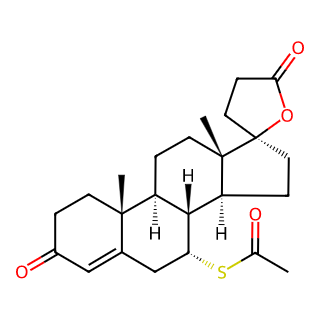- Synthetic anti-infective drugs
- Medications for the digestive system
- Antipyretic and analgesic drugs
- Medications for the blood system
- Medications for the respiratory system
- Anti-allergic drugs
- Medications for the urinary system
- Diagnostic medications
- Immunosuppressive and immunomodulatory drugs
- Vitamins and mineral supplements
- Antioxidants and medications for osteoporosis
- Antiparasitic drugs
- Ophthalmic medications
- Amino acids and their derivatives
- Dermatological medications
- Medications for the circulatory system
- Antitumor drugs
- Medications for the nervous system
- Hormonal and endocrine function-regulating drugs
- Antibiotics
- Others
CAS Number: 52-01-7




Basic Information
CAS Number: 52-01-7
Molecular Formula: C24H32O4S
Molecular Weight: 416.573 g/mol
EINECS Number: 200-133-6
Physical Properties
Appearance: White to off-white powder, or white or slightly yellow-white powder in some cases.
Melting Point: 198-208°C (literature value), with some sources specifying 207-208°C.
Boiling Point: 597°C at 760 mmHg, or a rough estimate of 504.87°C.
Density: 1.24 g/cm³ (or a rough estimate of 1.1061). The density may vary slightly depending on the source and conditions.
Refractive Index: -36° (C=1, CHCl3), or 1.586 in some sources. Note that refractive index values can be affected by measurement conditions.
Solubility: Practically insoluble in water. Soluble in ethanol, chloroform, benzene, and ethyl acetate.
Specific Optical Rotation: -33.5° (chloroform) or -37° (c=1, CHCl3), indicating that the compound is optically active.
Flash Point: 302.3°C, with some sources providing a range of 302.3±18.1°C.
PSA (Polar Surface Area): 85.74000 Ų, which is a measure of the hydrophilic or hydrophobic nature of the molecule.
LogP: 4.85230 or 3.12 (depending on the method of calculation), indicating that the compound is relatively lipophilic.
Chemical Properties
Stability: Stable under normal temperatures and pressures. However, it should be stored in a cool, dry, and well-ventilated area away from incompatible substances.
Decomposition: When heated to decomposition, it emits toxic fumes of sulfoxides.
Smell: Has a mild mercaptan-like odor.
Uses
Spironolactone is primarily used as a diuretic and an antihypertensive agent. It acts as a competitive inhibitor of aldosterone, thereby increasing water excretion and reducing sodium and potassium retention.
It is used to treat a variety of conditions, including edema, hypertension, primary aldosteronism, and to prevent hypokalemia when used in conjunction with other diuretics.

Tai Yau Street, San Po Kong, Kowloon, Hong Kong, China.



